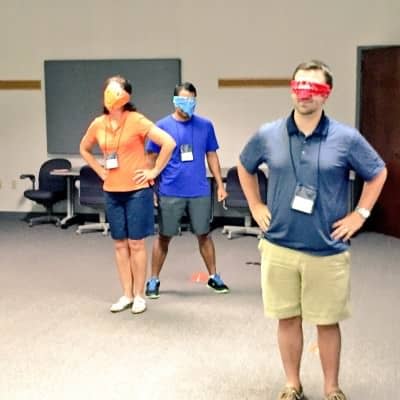Teacher Leadership:
A Partnership of School Need & Professional Elevation
Teacher-leadership (TL) has morphed into a “buzz-word,” like “STEM” or “PBIS.” We know teachers as leaders are needed, highlighted by the U.S. Department of Education’s Teach to Lead initiative.
As members of the state teacher leadership team, NCAE Vice President, Mark Jewel, and I led round table discussions at Guilford County Schools’ Mission Possible Teacher Leaders retreat in Asheville. These energetic educators providing valuable insight to the challenges of successful teacher leadership models, which boiled down to two points: crafting a common definition while outlining the differentiated need for teacher leaders.
Defining Teacher Leaders
Teachers as leaders in the school is not an innovative idea, but rather has changed from a role-specific job (i.e. department chair) to a sliding-position based on targeted school needs.
Traditionally the career ladder for an effective educator takes teachers out of the classroom. TL positions provide the necessary opportunities to remain in the classroom while providing career pathways for many educators frustrated with the current “promotional” model.
The needs of a school are vast and diverse, and they cannot all be successfully accomplished by just a handful of administrators. Providing teachers these opportunities to share in what has been seen as traditionally administrative responsibilities aids in building a school’s community, while also offering a career pathway for educators to remain with students.
The Need for Teacher Leaders
Peer Mentoring
With new teachers needing support and guidance from their veteran colleagues, the time restraints (especially at the elementary level) make it near to impossible for any effective coaching model to exist. A current N.Y. model demonstrates two active types of teacher leader roles designed for mentoring focus sharing on best instructional practices. These models directly impact teacher performance and professional growth.
Professional Development
District funds are strained. Money is just not available for personalized PD, and (like most professions) best practices change and practitioners need up-to-date training to provide the highest quality of instruction. Wake County’s Teacher Leadership Corp provides school-based teacher leaders training in digital resources, namely DiscoveryEducation, to take back to their professional learning teams—utilizing the training the trainer model of leadership for professional growth opportunities.
Low-Performing Student Support
The achievement gap and class sizes are growing. Teachers need help supporting lower-performing students to ensure equitable access to high quality instruction. Charlotte-Mecklenburg Schools’ Project L.I.F.T. utilizes teacher leaders as intervention specialists targeting low-performing students in building “a strong educational foundation.” Guilford County’s Mission Possible program, similarly, places teacher leaders in schools based on socio-economic factors to better retain and support teachers, with “the ultimate goal of increasing student achievement in schools with crucial needs.”
Professional Compensation and Pathways
These models address an underlying issue in education that when tackled could decrease teacher retention rates and increase teacher effectiveness—opportunities for higher pay and vertical movement in the profession. These roles are not extra duties, but rather an opportunity for a promotion within a classroom role and compensation as such.
Clear Selection & Defined Performance Standards
With any position, the effectiveness must be able to be evaluated. Selection and retention of teacher leaders must focus on credentials and performance, aligned with the research-based Teacher Leadership Exploratory Consortium’s model standards.
While TL opportunities exist outside districts’ capacity, schools are lacking the necessary resources to provide these experiences and roles within their buildings where they are needed the most. Teacher leadership serves as the perfect partnership of school-based needs with professional elevation of educators.


